| Srl | Item |
| 1 |
ID:
159762
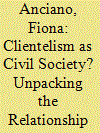

|
|
|
|
|
| Summary/Abstract |
This article, building on analyses from the global south, attempts to reframe democratic expectations by considering where previously maligned practices such as clientelism may hold moments of democracy. It does so by comparing the theory of civil society with that of clientelism, and its African counterpart neo-patrimonialism. It argues that clientelism as civil society may fulfil democratic tasks such as holding the (local) state accountable, strengthening civil and political liberties and providing channels of access for previously marginalised groups. Clientelism is not necessarily a reflection of imposed power relations but, at times, can demonstrate a conscious political strategy, to generate development, on the part of its protagonists.
|
|
|
|
|
|
|
|
|
|
|
|
|
|
|
|
| 2 |
ID:
149173
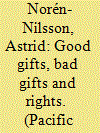

|
|
|
|
|
| Summary/Abstract |
In the Cambodian national elections in 2013, the opposition Cambodia National Rescue Party (CNRP) experienced a strong surge in support, finishing a close second to the long-incumbent Cambodian People’s Party (CPP). Whilst the CNRP campaigned on an anti-money politics, rights-based agenda, the CPP has relied on gift-giving practices to maintain links with voters. This article explores changing popular conceptions of issue_images_89_4_nilsson_cambodia-election-perceptions-ea-image02-jpgprovision to assess to what extent a democratic, rights-based conscience in Cambodia has emerged under the current neo-patrimonial regime. Building on qualitative interviews with 192 voters in post-election Cambodia, it finds that gift-giving practices play a different role than current academic theorizations of popular politics, and Cambodian popular politics in particular, would lead us to expect. Ordinary Cambodians are found to make a distinction between contingent and non-contingent exchanges in electoral mobilization, rejecting the former and embracing the latter. CPP gift giving in its current guise is consequently devoid of popular legitimacy across the political camps. At the same time, the idea of meritorious gift giving lives on as an ideal, especially among CNRP supporters.
|
|
|
|
|
|
|
|
|
|
|
|
|
|
|
|
| 3 |
ID:
152383
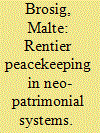

|
|
|
|
|
| Summary/Abstract |
International peacekeeping in Africa has developed dynamically in the last decade. The majority of global missions are deployed to the continent, the largest regional contingent of troops comes from Africa, and the African Peace and Security Architecture has made significant progress. Peacekeeping is Africanized today more than at any time before. However, mainstream research has insufficiently paid attention to African agency in this context. This article sheds light on the often neglected influence of African politics on international peacekeeping missions. The focus is set on the consequences of neo-patrimonial political systems, which can use international peacekeeping missions as an opportunity to generate rents. It will be shown that such a rent-seeking approach is highly problematic for the troop-contributing as well as mission-hosting countries. Instead of curbing conflict, rentier peacekeeping is prolonging and exporting it. The empirical examples used are the Burundian and Kenyan involvement in peacekeeping in Somalia.
|
|
|
|
|
|
|
|
|
|
|
|
|
|
|
|
| 4 |
ID:
151835
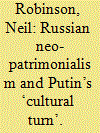

|
|
|
|
|
| Summary/Abstract |
Russian politics has been characterised by increasing cultural and political conservatism since Vladimir Putin’s return to the presidency. This article argues that Putin’s turn to cultural conservatism is a reaction to a crisis in Russia’s neo-patrimonial system. The article presents a model of neo-patrimonialism and argues that the turn to cultural conservatism under Putin is only a partial solution to the problems of neo-patrimonialism in Russia. This is because the turn towards cultural conservatism does not define any internal transformational tasks for Putin to fulfil.
|
|
|
|
|
|
|
|
|
|
|
|
|
|
|
|
| 5 |
ID:
159385
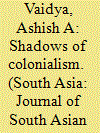

|
|
|
|
|
| Summary/Abstract |
This paper examines the status of tribal communities in central India through the lens of structural violence. In the process, a new and normatively grounded definition of violence is put forward which addresses weaknesses in the original definition proposed by Johan Galtung. The paper connects this new definition of structural violence to developmentalist and capitalist ideology, frameworks that benefit tribal communities by some empirical measures, but which must be recognised as profoundly violent in the normative contexts of those communities. Adivasis are caught between the competing imperatives of the Indian state's different and overlapping stages of modernist development: the remnants of the old colonial ‘civilising’ mission, a post-colonial nationalist industrialism and a post-industrial urge toward conservation. I argue that Galtung's definition is ill-suited to the task of describing this type of post-colonial structural violence, and that my definition solves this problem by accounting for the violence of conflicting normative frameworks.
|
|
|
|
|
|
|
|
|
|
|
|
|
|
|
|